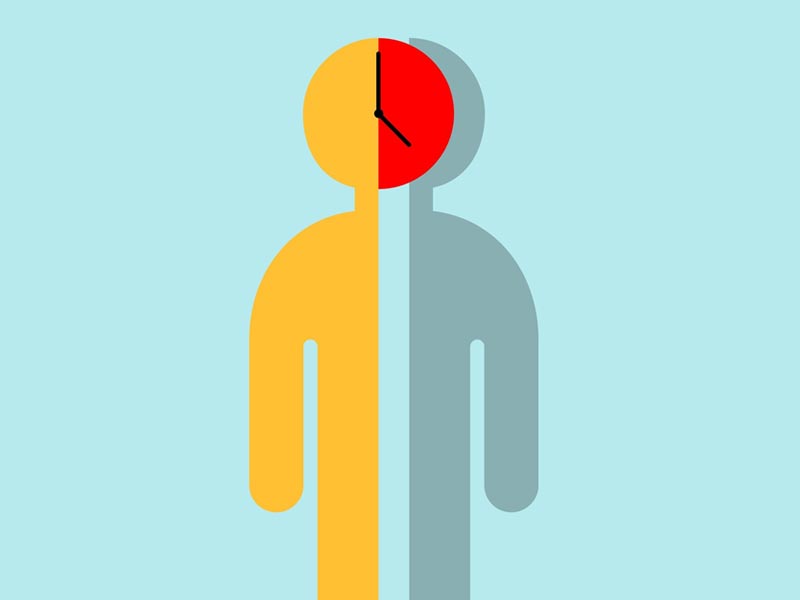
Our biological clock also known as the circadian rhythm is something that our physical, mental and behavioural habits depend upon. Cardian rhythm or cycle is an internal process that regulates a person’s sleep-wake cycle and repeats itself about every 24 hours. This is known as the biological clock as its main function is to coordinate the biological events of the body such as digestion, hormonal regulation and release, sleep body temperature, etc. The biological clock is responsible for dictating a person’s sleep patterns, melatonin levels, blood pressure, alertness and blood sugar levels. The body’s natural circadian rhythm tends to get affected or disrupted due to various factors such as pregnancy, irregular work schedules, napping and a change in time zones.
Table of Content:-
Let us go ahead and learn about the importance of circadian rhythm and take a look at a few suggestions by Dietician Mansi Padechia to keep your body clock ticking smoothly.
What is a Biological Clock?
View this post on Instagram
Body clock can simply be understood as a 24 hour rhythmic cycle that regulates the biological functions of the body. The circadian rhythm is responsible for dictating various bodily functions like sleeping, hormonal release, digestion, blood sugar, body temperature, melatonin and blood pressure levels. It is important to understand your biological clock in order to detect the disruption being caused in it. Understanding your eating and sleeping patterns will let you create a schedule for yourself according to the needs of your body.
Factors that might disrupt your Biological clock

Image Credits- sissenses
Also Read: 10 Tips for A Better Sleep
As of now we have got to know about what a biological clock is and why it is so important for our overall health and wellbeing. Let us take a look at some of the factors that might be responsible for disrupting the biological clock and proper body functioning.
- Time- Jet lag is a real thing and people whose body clock has been disrupted due to the changing time zones know that for sure. Not just telling across the world but suddenly starting to work for a night shift can have the same effects on your body. As you against the light dark cycle, it becomes a bit difficult for the body to adjust to these schedules.
- Food- What goes inside your body has a large impact on your overall health and wellbeing. One needs to be aware of what all they are eating and at what time they are eating. Consuming food right before bedtime can lead your blood sugar levels to spike really high. Due to this sudden spike, the kidneys need to work overtime and results in frequent urination
- Light- People are unaware of the fact that light can actually disrupt their sleep and hence the entire body clock. People are always advised to steer clear from any kind of electronic devices while going to bed as the light emitted from these devices might disrupt sleeping patterns and confuse your inner body clock.
- Emotional distress- Going through a sudden change, having an emotional imbalance, depression or bipolar disorder, all these things can result in imbalance serotonin secretion. Due to this a person;s sleep cycle and eating habits get distubed.
Steps to fix your biological clock
As by now we are well aware about what a biological clock is, what is its importance to lead a healthy life and a few factors that tend to disrupt the circadian rhythm. Let us take a quick look at a few steps suggested by Dietician Mansi Padechia to smoothen out your body clock and lead a healthy life.

Image Credits- Icebike
Also Read: World Bicycle Day 2021: 5 Life-Changing Health Benefits Of Cycling Daily
- Have a fixed eating window and follow it on a regular basis. A consistent eating schedule will enable your body clock to function properly.
- Do not sleep right after your meals. One must ensure that there is at least a gap of 2 hours between the last meal and bedtime. Going to bed right after dinner can lead to spiking your blood sugar levels and make your kidney work extra.
- There should be a gap of at least one hour between the time at which you wake up and your breakfast.
- Ensure that you are indulging yourself into some or the other kind of physical activity and are receiving the sunlight by soaking yourself into sun for at least 30 minutes a day.
- Decide a particular bed time i such a manner that you are getting 8 hours of sound sleep
- Your dinner should be planned in such a manner that it has less amounts of protein in it.
This article is based upon a post by Dietician Mansi Padechia, Lifestyle & Nutrition Coach, Fat Loss Expert, Diabetes Educator and PCOS Specialist on her instagram handle.
Also watch this video
How we keep this article up to date:
We work with experts and keep a close eye on the latest in health and wellness. Whenever there is a new research or helpful information, we update our articles with accurate and useful advice.
Current Version
